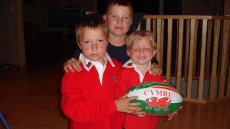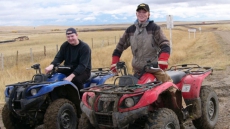VANCOUVER — Scientists who re-examined the fossils of mastodons that once roamed what is now the Yukon and Alaska have changed their thinking and now believe global cooling probably wiped out the ancient cousin of the elephant.
Earlier estimates dated the mastodon bones at about 14,000 years old, but a paleontologist in the Yukon Paleontology Program says radiocarbon dating now puts the fossils at about 75,000 years old.
Grant Zazula says that instead of dying off at the end of the ice age as first believed, mastodons are more likely to have migrated to the area during a warming trend.
He says scientists always believed the dating of the fossils was suspect because it placed the animals in a time interval when it was incredibly cold in the north — at the height of the last ice age.
"We know that mastodons — which are relatives of mammoths and elephants — are not really well adapted to cold conditions because their behaviour and their preferred habitats are forests. They eat forests-type plants," Zazula said.
Experts have always debated what drove so many of the animals to extinction around the same time.
One theory is that when humans moved in, they hunted the animals to extinction. Another theory suggests climate change at the end of the ice age wiped out dozens of species.
But the dating of the mammoth bones pre-dates both those occurrences, Zazula said.
"We actually learned — based on what we know of mastodons' preferred habitat — they were actually probably killed off by global cooling, rather than global warming."
Zazula said temperatures before the extinction were probably close to conditions we have today.
"A number of these animals, mastodons specifically, migrated northwards, established populations and then they were subsequently wiped out because it got cold again."
The discovery is another piece in the puzzle over the disappearance of the massive creatures. It also raises more questions about the extinction of other animals presumed to have been part of an extensive dieoff at the end of the ice age, Zazula said.
"There were periods in the past where populations were dying off because of other variables like cooling or warming. It wasn't one massive extinction at the end of the ice age. Rather it was sort of a punctuated process through time."
He said there are interesting similarities between now and warm periods in between past ice ages.
"We know with warming temperatures today, there are animals migrating northward as well. It provides a really interesting comparison from the fossil record of how these animals respond to global warming events."
He noted cougars and certain deer have been showing up in Yukon, something that hasn't been seen before.
Zazula was the lead author of a mastodon study published this week in the scientific journal Proceedings of the National Academy of Sciences.





